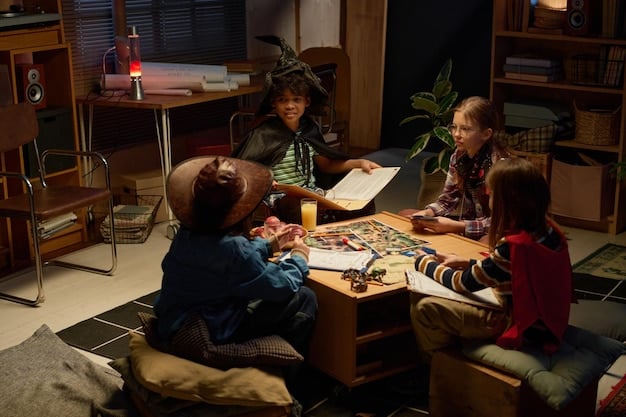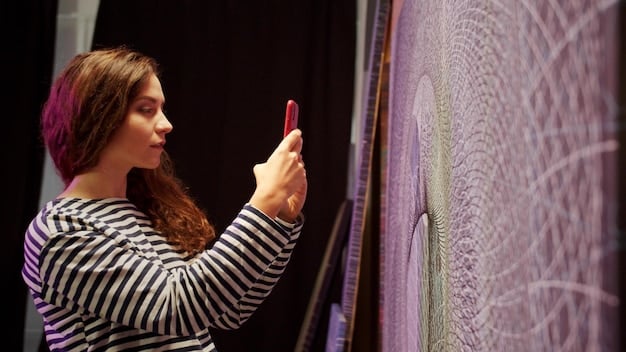Writers Room: How Finale Decisions Shape Your Favorite Series

From Script to Screen: A Look at How Writers Room Decisions Shape Series Finales explores the crucial role writers play in crafting memorable and impactful series endings, examining creative choices, challenges, and the collaborative process behind these pivotal moments in television history.
Ever wondered how your favorite TV series wraps up its storyline? The answer often lies within the writers’ room, where the fate of beloved characters and the satisfaction of millions of viewers are carefully debated and decided. Let’s delve into from Script to Screen: A Look at How Writers Room Decisions Shape Series Finales, uncovering the creative process and challenges that drive these pivotal moments in television history.
The Genesis of a Finale: Setting the Stage
Crafting a series finale is unlike any other episode in a show’s run. It requires not only tying up loose ends but also delivering a satisfying conclusion that resonates with viewers long after the credits roll. The seeds of a finale are often sown early in the show’s development, with broad strokes of the ultimate destination outlined from the outset.
Early Planning vs. Evolving Storylines
Some showrunners meticulously plan their finales from the very beginning, planting subtle clues and foreshadowing events seasons in advance. Others prefer a more organic approach, allowing the storyline to evolve naturally and shaping the finale based on the characters’ journeys and audience reception.
Balancing Fan Expectations and Creative Vision
One of the biggest challenges in writing a series finale is balancing the expectations of the fans with the creative vision of the writers. While fan theories and desires can be tempting to incorporate, ultimately, the finale must stay true to the show’s core themes and deliver a conclusion that feels earned and authentic.
- Long-Term Story Arcs: Writers map out key plot points and character developments over multiple seasons.
- Character Departures: Handling a character’s exit gracefully can significantly impact the finale.
- Surprise Twists: When to deploy unexpected plot twists for maximum emotional resonance.
- Satisfying Endings: Ensuring character arcs reach a logical and fulfilling conclusion.
Ultimately, the genesis of a finale is a delicate dance between planning and improvisation, fan service and artistic integrity. The best finales are those that manage to strike this balance, delivering a conclusion that is both surprising and satisfying.
The Writers’ Room Dynamic: Collaboration and Conflict
The writers’ room is a pressure cooker of creativity, where ideas are born, debated, and refined. It’s a collaborative environment, but also one where conflict is inevitable. The dynamic within the room can have a profound impact on the final product, especially when it comes to crafting a series finale.
Navigating Creative Differences
In a writers’ room, everyone has an opinion, and not all opinions are created equal. Navigating these creative differences requires strong leadership, open communication, and a willingness to compromise. Ultimately, the goal is to find the best idea, even if it’s not your own.
The Role of the Showrunner
The showrunner is the captain of the ship, responsible for setting the tone and direction of the writers’ room. They must be able to mediate disputes, make tough decisions, and ensure that the finale stays true to the show’s overall vision.
- Brainstorming Sessions: Generate multiple ideas for the finale’s key moments and plot resolutions.
- Character Perspectives: Explore the finale from different characters’ viewpoints to add depth.
- Conflict Resolution: How writers mediate disagreements to arrive at the strongest narrative choices.
- Maintaining Cohesion: Ensuring the finale aligns with the show’s established themes and tone.

The writers’ room dynamic is a complex and often contentious one. But it’s also where the magic happens. When a group of talented writers come together with a shared goal and a willingness to challenge each other, the results can be truly extraordinary.
Creative Roadblocks: Overcoming Finale Challenges
Writing a series finale is not without its challenges. From satisfying long-time viewers to dealing with network interference, writers face a myriad of obstacles in bringing their vision to life. Overcoming these roadblocks requires creativity, perseverance, and a willingness to adapt.
Dealing with Network Notes
Network executives often have their own ideas about how a series should end, and these ideas don’t always align with the writers’ vision. Learning to navigate these network notes, while staying true to the show’s core values, is a crucial skill for any showrunner.
Avoiding Cliches and Predictability
Series finales are often scrutinized more closely than any other episode, making it all the more important to avoid cliches and predictable storylines. Finding fresh, innovative ways to resolve conflicts and surprise viewers is essential for a memorable finale.
Balancing Multiple Storylines
Many series have multiple storylines running simultaneously, each of which needs to be resolved in the finale. Balancing these storylines, while giving each one the attention it deserves, can be a daunting task.
- Unresolved Plots: Strategically tying up loose ends to give viewers a sense of completion.
- Character Deaths: Deciding which characters, if any, should meet their end in the finale.
- Fan Service vs. Originality: Balancing what fans want with the writers’ unique vision.
- Ending on a High Note: Crafting a final scene that leaves a lasting impression on the audience.
Despite the challenges, the best series finales are those that find a way to overcome these obstacles and deliver a satisfying conclusion that stays true to the show’s vision. It requires hard work and patience, but the reward is a finale that will be remembered for years to come.
Fan Theories and Expectations: To Listen or Ignore?
In the age of social media, fan theories and expectations have become a significant factor in the creation of series finales. While engaging with fans can be rewarding, writers must also be careful not to let fan theories dictate their creative choices.
The Power of Online Communities
Online communities can be a valuable resource for writers, providing insights into what fans are enjoying and what they’re hoping to see in the finale. However, it’s important to remember that these communities represent only a fraction of the show’s overall audience.
Avoiding Fan Service for the Sake of It
Giving fans what they want can be tempting, but it’s essential to avoid fan service for the sake of it. The finale should serve the story first and foremost, and any fan service should feel organic and earned.

Ultimately, the decision of whether to listen to or ignore fan theories is a personal one. But writers should always prioritize their own creative vision and the needs of the story.
The Impact of Finales: Legacy and Lasting Impressions
A well-crafted series finale can elevate a show from good to great, cementing its place in television history. But a poorly executed finale can tarnish the show’s legacy and leave viewers feeling disappointed. The impact of a finale is significant and long-lasting.
Measuring Success: Ratings vs. Critical Acclaim
The success of a finale is often measured by its ratings, but critical acclaim is just as important. A finale that pleases both viewers and critics is a rare and valuable achievement.
The Show’s Enduring Popularity
A satisfying finale can increase a show’s watchability in syndication and streaming, ensuring its enduring popularity for years to come. Conversely, a disappointing finale can lead to a decline in viewership and a negative impact on the show’s overall legacy.
The from Script to Screen: A Look at How Writers Room Decisions Shape Series Finales can influence how the show is remembered and appreciated. Shows such as Breaking Bad created amazing finales that are talked about for years after.
Case Studies: Memorable and Controversial Finales
Looking at specific examples of famous series finales can provide valuable insights into what works and what doesn’t. From the critically acclaimed conclusion of “Breaking Bad” to the divisive ending of “Game of Thrones,” there’s much to be learned from studying these case studies.
“Breaking Bad”: A Masterclass in Closure
The finale of “Breaking Bad” is often cited as one of the best in television history. It provided a satisfying conclusion to Walter White’s transformation, while also leaving room for interpretation and discussion.
“Game of Thrones”: Divisive But Impactful
The finale of “Game of Thrones” was highly anticipated but ultimately proved to be divisive among fans. While some praised its boldness, others criticized its rushed pacing and unsatisfying character arcs.
“Friends”: A Sentimental Farewell
The series finale of “Friends” delivered a heartwarming and sentimental conclusion to the show’s ten-year run, providing closure for each of the main characters and leaving viewers with a sense of nostalgia and fondness.
The Future of Finales: Trends and Innovations
As television continues to evolve, so too will the art of crafting series finales. New trends and innovations are emerging, promising to change the way we experience the end of our favorite shows. Factors like streaming platforms are changing the way show endings are done.
Interactive Storytelling and Alternate Endings
Interactive storytelling, where viewers can influence the outcome of a story, is becoming increasingly popular. This could lead to finales with alternate endings, allowing viewers to choose their own preferred conclusion.
Limited Series and Anthology Formats
The rise of limited series and anthology formats, which tell self-contained stories over a single season, could reduce the pressure on writers to deliver a grand, all-encompassing finale. Instead, they can focus on crafting a satisfying conclusion to a smaller, more focused narrative.
| Key Point 🎬 | Brief Description |
|---|---|
| 💡 Planning Early | Outlining broad strokes of the finale early in the show’s development. |
| 🤝 Writers’ Room | Collaboration and navigating creative differences are crucial. |
| 🚫 Avoiding Cliches | Finding innovative ways to resolve conflicts and surprise viewers. |
| 📢 Fan Theories | Balancing engagement with fan expectations and creative vision. |
FAQ
▼
Series finales are vital because they offer closure to long-term storylines, solidify a show’s legacy, and leave a lasting impression on viewers. A well-executed finale can elevate a series, while a poor one can tarnish its overall reputation.
▼
Fan theories can influence finales to varying degrees. Some writers engage with fan communities for inspiration, while others prioritize their creative vision. Balancing fan expectations with original storytelling is a key challenge.
▼
A successful series finale typically provides closure to major plot points, stays true to established character arcs, and offers an emotional payoff for viewers. It balances nostalgia with forward-looking elements, leaving a satisfying and memorable experience.
▼
The showrunner is crucial in guiding the finale’s direction. They mediate creative disputes, ensure the finale aligns with the show’s vision, and make critical decisions about plot and character resolutions, ultimately steering the writers’ room.
▼
Writers face challenges such as network interference, avoiding clichés, managing multiple storylines, and balancing fan expectations with creative vision. Overcoming these obstacles requires creativity, perseverance, and adaptation.
Conclusion
Ultimately, crafting a series finale is a complex and challenging endeavor that requires careful planning, collaboration, and a deep understanding of the show’s core themes and characters. While there’s no one-size-fits-all formula for success, the best finales are those that manage to strike a balance between fan expectations, creative vision, and the need for a satisfying conclusion.





